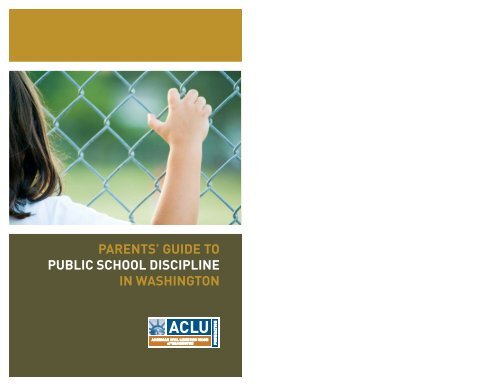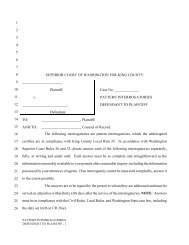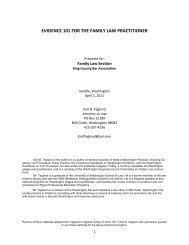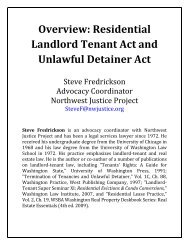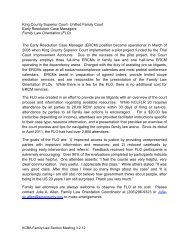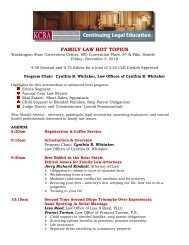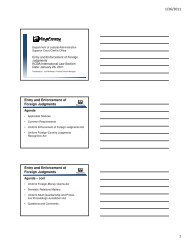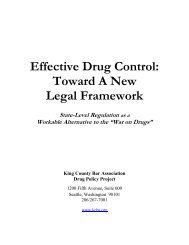parents' guide to public school discipline in washington - ACLU of ...
parents' guide to public school discipline in washington - ACLU of ...
parents' guide to public school discipline in washington - ACLU of ...
You also want an ePaper? Increase the reach of your titles
YUMPU automatically turns print PDFs into web optimized ePapers that Google loves.
PARENTS’ GUIDE TOPUBLIC SCHOOL DISCIPLINEIN WASHINGTON
Parents’ Guide <strong>to</strong> Public School Discipl<strong>in</strong>e<strong>in</strong> Wash<strong>in</strong>g<strong>to</strong>nThis <strong>guide</strong> provides nuts-and-bolts advice for parents and guardianswhose children are fac<strong>in</strong>g discipl<strong>in</strong>ary proceed<strong>in</strong>gs <strong>in</strong> <strong>public</strong> <strong>school</strong>s.It is not meant <strong>to</strong> provide legal advice. Students who want <strong>to</strong> advocatefor themselves can also use this <strong>guide</strong>, but we recommend that theyseek the advice <strong>of</strong> a youth advocate <strong>to</strong> help them through the process.This <strong>guide</strong> expla<strong>in</strong>s the rights <strong>of</strong> students <strong>in</strong> Wash<strong>in</strong>g<strong>to</strong>n state’s <strong>public</strong><strong>school</strong>s. Different rules may apply <strong>in</strong> private <strong>school</strong>s, tribal <strong>school</strong>s, or<strong>public</strong> colleges and universities.For more <strong>in</strong>formation, please see the American Civil Liberties Union<strong>of</strong> Wash<strong>in</strong>g<strong>to</strong>n <strong>public</strong>ations, Parents’ Guide <strong>to</strong> School Board Advocacy<strong>in</strong> Wash<strong>in</strong>g<strong>to</strong>n, Parents’ Guide <strong>to</strong> Truancy <strong>in</strong> Wash<strong>in</strong>g<strong>to</strong>n, andKnow Your Rights – A Guide for Public School Students <strong>in</strong> Wash<strong>in</strong>g<strong>to</strong>n,available on our Web site: www.aclu-wa.org.Cover design graciously donated by:Michael Mahoney <strong>of</strong> Hat Head Studios, LLCPublished March 2007A project <strong>of</strong> the American Civil Liberties Union<strong>of</strong> Wash<strong>in</strong>g<strong>to</strong>n Foundation
2 Parents’ Guide <strong>to</strong> Public School Discipl<strong>in</strong>e <strong>in</strong> Wash<strong>in</strong>g<strong>to</strong>n Parents’ Guide <strong>to</strong> Public School Discipl<strong>in</strong>e <strong>in</strong> Wash<strong>in</strong>g<strong>to</strong>n 3INTRODUCTIONThe law allows <strong>school</strong>s <strong>to</strong> <strong>discipl<strong>in</strong>e</strong> students <strong>in</strong> order <strong>to</strong> ensure aneffective learn<strong>in</strong>g environment and <strong>to</strong> teach students about properconduct. If your child has misbehaved, <strong>school</strong> <strong>discipl<strong>in</strong>e</strong> proceed<strong>in</strong>gscan <strong>of</strong>fer a valuable opportunity <strong>to</strong> improve communication withteachers and pr<strong>in</strong>cipals.In some cases, however, you might not agree with the <strong>school</strong> aboutwhat actually happened. There may be parts <strong>of</strong> the discipl<strong>in</strong>ary processthat do not seem fair. You might feel that the punishment the<strong>school</strong> wants <strong>to</strong> impose is <strong>in</strong>appropriate. This <strong>guide</strong> <strong>of</strong>fers suggestionsfor all <strong>of</strong> these situations.Even if your ma<strong>in</strong> goal is <strong>to</strong> reverse a punishment you disagree with,you can use the opportunity <strong>to</strong> explore common ground. At <strong>school</strong><strong>discipl<strong>in</strong>e</strong> meet<strong>in</strong>gs, you can also discuss other related subjects such as:class assignment or schedul<strong>in</strong>g changescounsel<strong>in</strong>gtu<strong>to</strong>r<strong>in</strong>gspecial educationaccommodation <strong>of</strong> a handicap; orprotection from bully<strong>in</strong>g or harassmentRemember, <strong>school</strong> <strong>discipl<strong>in</strong>e</strong> decisions <strong>of</strong>ten result from angry situations,and they can sometimes provoke anger <strong>in</strong> turn. School personnel– and your child – may feel that their pride and ego are on thel<strong>in</strong>e. Try <strong>to</strong> make a special effort <strong>to</strong> rema<strong>in</strong> calm and approach <strong>school</strong>personnel without be<strong>in</strong>g confrontational. In <strong>school</strong> <strong>discipl<strong>in</strong>e</strong> matters,you are likely <strong>to</strong> reach a more successful outcome if you can rema<strong>in</strong>level-headed and diplomatic.
4 Parents’ Guide <strong>to</strong> Public School Discipl<strong>in</strong>e <strong>in</strong> Wash<strong>in</strong>g<strong>to</strong>n Parents’ Guide <strong>to</strong> Public School Discipl<strong>in</strong>e <strong>in</strong> Wash<strong>in</strong>g<strong>to</strong>n 5There are three basic steps most parents f<strong>in</strong>d helpful <strong>in</strong> understand<strong>in</strong>gand challeng<strong>in</strong>g <strong>school</strong> <strong>discipl<strong>in</strong>e</strong>:Step One: Gather InformationStep Two: Develop a StrategyStep Three: Advocate Your PositionEach step is described below, organized around the questions youshould be ask<strong>in</strong>g.STEP ONE: GATHER INFORMATIONTo respond effectively <strong>to</strong> <strong>school</strong> <strong>discipl<strong>in</strong>e</strong>, you will need <strong>to</strong> understandthe situation from both your child’s and the <strong>school</strong>’s po<strong>in</strong>t <strong>of</strong>view.Start by gather<strong>in</strong>g <strong>in</strong>formation about what happened. Some questions<strong>to</strong> ask are:1. What happened, <strong>in</strong> your child’s words?2. What has the <strong>school</strong> accused your child <strong>of</strong> do<strong>in</strong>g?3. What rule is your child accused <strong>of</strong> break<strong>in</strong>g?4. What punishment does the <strong>school</strong> want <strong>to</strong> impose?5. What will the last<strong>in</strong>g impacts be?As you gather your facts, keep careful notes! Before you forget,write down what you th<strong>in</strong>k happened.Make note <strong>of</strong>:Keep copies <strong>of</strong>:The timel<strong>in</strong>e <strong>of</strong> eventsWhom you met withor talked <strong>to</strong>What you talked aboutAll letters (<strong>in</strong>clud<strong>in</strong>g e-mails!)and forms from the <strong>school</strong>All letters you send <strong>to</strong>the <strong>school</strong>1. What happened – <strong>in</strong> your child’s words?Ask your child about what happened and who was <strong>in</strong>volved. F<strong>in</strong>d outwhat punishment the pr<strong>in</strong>cipal or teacher said they would impose(detention, suspension, expulsion, etc.). Use this opportunity <strong>to</strong> f<strong>in</strong>dout if your child feels misunders<strong>to</strong>od or wrongly accused. Also, askwhether there are problems at <strong>school</strong> that your child was react<strong>in</strong>g <strong>to</strong>,like be<strong>in</strong>g bullied or hav<strong>in</strong>g trouble keep<strong>in</strong>g up <strong>in</strong> class.
6 Parents’ Guide <strong>to</strong> Public School Discipl<strong>in</strong>e <strong>in</strong> Wash<strong>in</strong>g<strong>to</strong>n Parents’ Guide <strong>to</strong> Public School Discipl<strong>in</strong>e <strong>in</strong> Wash<strong>in</strong>g<strong>to</strong>n 72. What is your child accused <strong>of</strong> do<strong>in</strong>g?Talk <strong>to</strong> your child’s teachers, pr<strong>in</strong>cipal, or counselors <strong>to</strong> learn fromthem what your child is accused <strong>of</strong> do<strong>in</strong>g. If there is a disagreementabout what happened, see if other eyewitnesses can clarify the facts.These witnesses may <strong>in</strong>clude other students, teachers, staff, or parents.3. What rule is your child accused <strong>of</strong> break<strong>in</strong>g?Schools should only punish students who have violated <strong>school</strong> rules.Insist that the <strong>school</strong> identify the written rule(s) your child allegedlybroke. School rules can be found <strong>in</strong> two different places:Student handbook. Most<strong>school</strong>s pass out student handbooksat the beg<strong>in</strong>n<strong>in</strong>g <strong>of</strong> eachyear that <strong>in</strong>clude <strong>school</strong> rulesand other <strong>in</strong>formation. If youdo not have your copy <strong>of</strong> thestudent handbook, ask the<strong>school</strong> for a new one.School district policies. Each<strong>school</strong> board adopts a variety <strong>of</strong>policies that control its actions,<strong>in</strong>clud<strong>in</strong>g policies on <strong>school</strong><strong>discipl<strong>in</strong>e</strong>. The policies mostrelevant <strong>to</strong> you will probablybe found under the head<strong>in</strong>gs“Students” or “Discipl<strong>in</strong>e.”District policies are available atthe district <strong>of</strong>fice, at your child’sGett<strong>in</strong>g DistrictPoliciesIf you are hav<strong>in</strong>g anytrouble gett<strong>in</strong>g copies<strong>of</strong> <strong>school</strong> policies, letthe district <strong>of</strong>fice knowthat you are mak<strong>in</strong>g arequest under Wash<strong>in</strong>g<strong>to</strong>n’sPublic Records Act,RCW 42.56. The <strong>school</strong>is required <strong>to</strong> respondwith<strong>in</strong> 5 days <strong>of</strong> yourrequest. It must eitherprovide you with therecords or expla<strong>in</strong> why itwill take them longer.<strong>school</strong>, or sometimes onl<strong>in</strong>e. You can request <strong>school</strong> policiesand other <strong>school</strong> records by contact<strong>in</strong>g your <strong>school</strong> or distric<strong>to</strong>ffice. They should give them <strong>to</strong> you right away.If English is not your primary language, ask the pr<strong>in</strong>cipal or the distric<strong>to</strong>ffice for copies <strong>of</strong> the student handbook and policies written <strong>in</strong>your language. Or, if necessary, call the pr<strong>in</strong>cipal or the district <strong>of</strong>fice<strong>to</strong> ask for a written or spoken translation.Students with DisabilitiesStudents with disabilities have additional rights relat<strong>in</strong>g <strong>to</strong><strong>school</strong> <strong>discipl<strong>in</strong>e</strong>. If your child is receiv<strong>in</strong>g special educationservices or might be eligible for them, be sure <strong>to</strong> ask for policiesand procedures for the <strong>discipl<strong>in</strong>e</strong> <strong>of</strong> students with disabilities. Consider seek<strong>in</strong>g additional guidance from a specialeducation advocate.4. What punishment will the <strong>school</strong> impose?It is important <strong>to</strong> get a clear statement from <strong>school</strong> <strong>of</strong>ficials aboutexactly what type <strong>of</strong> punishment they want <strong>to</strong> impose. State regulationsgive parents and students important rights that differ accord<strong>in</strong>g<strong>to</strong> the punishment imposed.Go<strong>in</strong>g from most <strong>to</strong> least severe, the forms <strong>of</strong> punishment commonlyused <strong>in</strong> Wash<strong>in</strong>g<strong>to</strong>n are:Expulsion. The student may not attend <strong>school</strong> for an <strong>in</strong>def<strong>in</strong>iteperiod <strong>of</strong> time.Long-term suspension. The student may not attend <strong>school</strong> fora def<strong>in</strong>ite period <strong>of</strong> time longer than 10 days.Short-term suspension. The student may not attend <strong>school</strong>for 10 or fewer <strong>school</strong> days. Some <strong>school</strong>s assign students <strong>to</strong><strong>in</strong>-<strong>school</strong> suspension, where the student may not attend hisor her regular classroom but rema<strong>in</strong>s <strong>in</strong> a study hall or quietroom.Exclusion. The student is barred from a particular teacher’sclass or activity.Detention. The student must stay after <strong>school</strong>, dur<strong>in</strong>g lunchtimeor on Saturday for a period <strong>of</strong> time, typically seated <strong>in</strong> a
8 Parents’ Guide <strong>to</strong> Public School Discipl<strong>in</strong>e <strong>in</strong> Wash<strong>in</strong>g<strong>to</strong>n Parents’ Guide <strong>to</strong> Public School Discipl<strong>in</strong>e <strong>in</strong> Wash<strong>in</strong>g<strong>to</strong>n 9study hall or quiet room.School or community service. The student must perform aservice for the <strong>school</strong> or community, such as clean<strong>in</strong>g up graffitior pick<strong>in</strong>g up litter.Other. Schools have flexibility <strong>to</strong> impose punishments such asrevok<strong>in</strong>g library, computer, or sports privileges, or hav<strong>in</strong>g thestudent do extra <strong>school</strong>work, pay for lost or damaged property,or apologize <strong>to</strong> persons affected by the misconduct.These forms <strong>of</strong> <strong>discipl<strong>in</strong>e</strong> should only be imposed after: (1) giv<strong>in</strong>g thestudent some oral or written notice that punishment is be<strong>in</strong>g consideredand (2) giv<strong>in</strong>g the student some opportunity <strong>to</strong> be heard.Emergency expulsions and emergency removalsIf the student’s conduct causes an immediate and cont<strong>in</strong>u<strong>in</strong>g danger<strong>to</strong> others or <strong>to</strong> the educational process, the <strong>school</strong> may take actionwithout provid<strong>in</strong>g the student an opportunity <strong>to</strong> be heard first. A studentcan be removed from a s<strong>in</strong>gle class, or removed from the <strong>school</strong>entirely on an emergency basis.Emergency removals are removals from a classroom. They maylast no more than 1 day.Emergency expulsions are expulsions from <strong>school</strong>. They haveno fixed time limit. But emergency expulsions should last onlyas long as the student’s presence causes an immediate danger.Additional limits on punishmentsThere are some additional limits on the type <strong>of</strong> punishment <strong>school</strong>scan impose, <strong>in</strong>clud<strong>in</strong>g:The length <strong>of</strong> any suspension or expulsion must be appropriate<strong>in</strong> light <strong>of</strong> the student’s behavior.Students generally should not be suspended or expelled for afirst-time <strong>of</strong>fense, unless their actions constitute “exceptionalmisconduct” as determ<strong>in</strong>ed by the <strong>school</strong> district. Your <strong>school</strong>’shandbook and/or <strong>school</strong>district policies should listthe <strong>of</strong>fenses that your districtconsiders “exceptionalmisconduct” and theirstandard punishments.Students cannot besuspended for unexcusedabsences unless the <strong>school</strong>has taken several priorsteps. Schools must havegiven the parent writtennotice <strong>of</strong> the student’sabsences <strong>in</strong> the parent’sprimary language; scheduleda conference <strong>to</strong>discuss the absences; andtaken appropriate steps<strong>to</strong> reduce or elim<strong>in</strong>ateabsences.Zero TolerancePoliciesSome districts have “zero<strong>to</strong>lerance” policies forcerta<strong>in</strong> <strong>of</strong>fenses, like br<strong>in</strong>g<strong>in</strong>gfirearms or drugs <strong>to</strong><strong>school</strong>. They are called zero<strong>to</strong>lerance policies becausethey establish standardpunishments regardless <strong>of</strong><strong>in</strong>dividual circumstances.The punishments are <strong>of</strong>tensevere, even for first-time<strong>of</strong>fenses.Even if a <strong>school</strong> has a zero<strong>to</strong>lerance policy, Wash<strong>in</strong>g<strong>to</strong>nlaw says <strong>school</strong> <strong>of</strong>ficialsmust be able <strong>to</strong> considerthe circumstances <strong>of</strong> eachcase and reduce the punishmentif appropriate.Students <strong>in</strong> grades K-4may not be put onlong-term suspensions,and may not be suspended for more than 10 days per semester.Check your <strong>school</strong>’s policies <strong>to</strong> see if there are other limitations.5. What is the last<strong>in</strong>g impact <strong>of</strong> the <strong>discipl<strong>in</strong>e</strong>?Your decision <strong>to</strong> challenge <strong>school</strong> <strong>discipl<strong>in</strong>e</strong> may depend on the consequences.Make sure you fully understand how the <strong>school</strong> <strong>in</strong>tends <strong>to</strong>record the <strong>discipl<strong>in</strong>e</strong> and what effect it will have on the rest <strong>of</strong> yourchild’s education.Academic grades and creditExpulsion: Expulsion can have the most serious impact on a student’s
10 Parents’ Guide <strong>to</strong> Public School Discipl<strong>in</strong>e <strong>in</strong> Wash<strong>in</strong>g<strong>to</strong>n Parents’ Guide <strong>to</strong> Public School Discipl<strong>in</strong>e <strong>in</strong> Wash<strong>in</strong>g<strong>to</strong>n 11grades and academic achievement. Students who are expelled mayface an extended period <strong>of</strong> time out <strong>of</strong> <strong>school</strong>. However, no form <strong>of</strong><strong>discipl<strong>in</strong>e</strong> should be enforced <strong>in</strong> a way that prevents a student fromcomplet<strong>in</strong>g a grade or a subject, or meet<strong>in</strong>g graduation requirements.Schools should help expelled students enroll <strong>in</strong> an alternative <strong>school</strong>or program, or f<strong>in</strong>d another way <strong>to</strong> cont<strong>in</strong>ue their education.Long-term suspension: A suspensionmay also affect a student’sgrades. But <strong>school</strong>s cannotimpose any s<strong>in</strong>gle long-termsuspension if it causes the student<strong>to</strong> lose more than 1 semester’sgrade or credit <strong>in</strong> a s<strong>in</strong>gle year.Depend<strong>in</strong>g on the length <strong>of</strong> thelong-term suspension, studentsshould ask the <strong>school</strong> for help <strong>in</strong>enroll<strong>in</strong>g <strong>in</strong> a different programor f<strong>in</strong>d<strong>in</strong>g an alternative way <strong>to</strong>cont<strong>in</strong>ue their education.Short-term suspension: Anystudent who receives a short-termsuspension must have the opportunity<strong>to</strong> make up assignmentsand tests that could otherwise significantlyaffect grades or preventthe student from receiv<strong>in</strong>g creditfor the course.Make Sure Your ChildCan Keep Up <strong>in</strong> SchoolIf your child is put on ashort-term suspension: Be sure <strong>to</strong> getmake-up assignmentsand testsIf your child is put on along-term suspension orexpulsion: Try <strong>to</strong> get your childenrolled <strong>in</strong> an alternative<strong>school</strong>; or Work with the <strong>school</strong><strong>to</strong> arrange anotherway for your child <strong>to</strong>cont<strong>in</strong>ue learn<strong>in</strong>g, <strong>in</strong> a<strong>school</strong> or communitybasedprogram, or athome.Other: Lesser forms <strong>of</strong>punishment that do not <strong>in</strong>volvesuspension or expulsion from <strong>school</strong> should not affect a student’sgrades or ability <strong>to</strong> graduate.Discipl<strong>in</strong>e recordsYou should also consider the future impact <strong>of</strong> <strong>discipl<strong>in</strong>e</strong> records.Discipl<strong>in</strong>ary records are usually destroyed after graduation, but youshould f<strong>in</strong>d out how long your <strong>school</strong> keeps them. Also ask whetherthey are kept separately from academic <strong>in</strong>formation.Discipl<strong>in</strong>ary <strong>in</strong>formation should not appear on a student’s transcript.Colleges: Colleges should not have access <strong>to</strong> a student’s discipl<strong>in</strong>aryhis<strong>to</strong>ry. The federal Family Educational Rights and Privacy Act(FERPA) gives parents access <strong>to</strong> most <strong>school</strong> records and preventstheir release <strong>to</strong> most third parties without parents’ written consent.So <strong>school</strong>s may not release discipl<strong>in</strong>ary records <strong>to</strong> colleges withoutwritten consent from a parent, or from students who are 18 years oldor legally emancipated. However, some colleges ask students who areapply<strong>in</strong>g whether they were ever <strong>discipl<strong>in</strong>e</strong>d <strong>in</strong> high <strong>school</strong>.Other <strong>public</strong> <strong>school</strong>s: If your child transfers <strong>to</strong> a different <strong>school</strong>, theorig<strong>in</strong>al <strong>school</strong> can send your child’s <strong>discipl<strong>in</strong>e</strong> records <strong>to</strong> the new<strong>school</strong>, without your consent.If your child moves <strong>to</strong> a different district, the new <strong>school</strong> cannotrefuse <strong>to</strong> enroll your child because <strong>of</strong> a discipl<strong>in</strong>ary record <strong>in</strong> the olddistrict. If your child has not moved, and you are request<strong>in</strong>g a transfer<strong>to</strong> a <strong>school</strong> <strong>in</strong> the same or a different district, your child’s discipl<strong>in</strong>aryrecord might be considered by the new <strong>school</strong> <strong>in</strong> their decisionwhether <strong>to</strong> enroll your child.Referral <strong>to</strong> police or prosecu<strong>to</strong>rSometimes <strong>school</strong> <strong>discipl<strong>in</strong>e</strong> <strong>in</strong>cidents are also referred <strong>to</strong> the policeor the prosecu<strong>to</strong>r.If a <strong>discipl<strong>in</strong>e</strong> <strong>in</strong>cident is referred <strong>to</strong> the police or prosecu<strong>to</strong>r, youshould try <strong>to</strong> f<strong>in</strong>d an at<strong>to</strong>rney immediately. An at<strong>to</strong>rney can helpprotect your child’s rights and help develop the best strategy foraddress<strong>in</strong>g the potential crim<strong>in</strong>al and <strong>school</strong> discipl<strong>in</strong>ary issues.
12 Parents’ Guide <strong>to</strong> Public School Discipl<strong>in</strong>e <strong>in</strong> Wash<strong>in</strong>g<strong>to</strong>n Parents’ Guide <strong>to</strong> Public School Discipl<strong>in</strong>e <strong>in</strong> Wash<strong>in</strong>g<strong>to</strong>n 13STEP TWO: DEVELOP A STRATEGYPreparation is an important <strong>in</strong>gredient for success. School adm<strong>in</strong>istra<strong>to</strong>rscannot do what you want unless they understand what you areask<strong>in</strong>g for and why.1. What is your goal?Th<strong>in</strong>k carefully about what you want <strong>to</strong> achieve. Goals <strong>to</strong> consider<strong>in</strong>clude:Revers<strong>in</strong>g the <strong>discipl<strong>in</strong>e</strong>Keep<strong>in</strong>g the same <strong>discipl<strong>in</strong>e</strong>,but tak<strong>in</strong>g steps <strong>to</strong> reduce itsacademic impact (for example,mak<strong>in</strong>g sure the absences willnot affect the student’s grades)Return<strong>in</strong>g the student <strong>to</strong><strong>school</strong> as soon as possibleReduc<strong>in</strong>g the length or severity<strong>of</strong> the punishmentSchedul<strong>in</strong>g suspension days ordetentions so they do not conflictwith academic or familyschedulesAccept<strong>in</strong>g a reduced punishment<strong>in</strong> exchange for certa<strong>in</strong>promises by the family (forexample, an apology by theAs you prepare<strong>to</strong> meet with<strong>school</strong> <strong>of</strong>ficialsstudent, an agreement for improved behavior, a psychologicalevaluation, therapy, or substance abuse treatment)Chang<strong>in</strong>g classes <strong>to</strong> avoid personality conflicts with particularteachers or studentsTh<strong>in</strong>k about yourgoal. What outcomedo you want?Th<strong>in</strong>k about whythe <strong>school</strong> shouldchange its m<strong>in</strong>d; andMake an outl<strong>in</strong>e!That way you will notforget what you want<strong>to</strong> say under thepressure <strong>of</strong> a meet<strong>in</strong>gor hear<strong>in</strong>g.Establish<strong>in</strong>g or modify<strong>in</strong>g an <strong>in</strong>dividualized education plan fordisabled or special education studentsTransferr<strong>in</strong>g <strong>to</strong> another <strong>school</strong> <strong>in</strong> the same district or a different<strong>school</strong> districtTh<strong>in</strong>k about the long term: When th<strong>in</strong>k<strong>in</strong>g about your goals,remember that you and your family will likely need <strong>to</strong> ma<strong>in</strong>ta<strong>in</strong> anongo<strong>in</strong>g relationship with the <strong>school</strong>. Your child might have severalyears left <strong>in</strong> the same <strong>school</strong> or <strong>school</strong> district. It might work aga<strong>in</strong>styou <strong>in</strong> the long term if you take an aggressive position that antagonizes<strong>school</strong> <strong>of</strong>ficials. On the other hand, you can use the discipl<strong>in</strong>aryprocess <strong>to</strong> develop relationships with <strong>school</strong> <strong>of</strong>ficials who might beable <strong>to</strong> help you get better educational services for your child <strong>in</strong> thefuture.2. Why should the <strong>school</strong> change its decision?School authorities will not change their m<strong>in</strong>d about how <strong>to</strong> <strong>discipl<strong>in</strong>e</strong>your child unless you can conv<strong>in</strong>ce them there is someth<strong>in</strong>g wrongwith their decision. Depend<strong>in</strong>g on the circumstances, one or more <strong>of</strong>the follow<strong>in</strong>g arguments might be persuasive.Your child is <strong>in</strong>nocent. Sometimes students are wronglyaccused, wrongly identified, or there are misunderstand<strong>in</strong>gsabout students’ actions. It can be difficult <strong>to</strong> w<strong>in</strong> <strong>in</strong> these cases.But, it helps if you can f<strong>in</strong>d witnesses or evidence <strong>to</strong> back upyour child’s explanation <strong>of</strong> what actually happened. It alsohelps if you can expla<strong>in</strong> how your child was misunders<strong>to</strong>od orfalsely accused. However, if <strong>school</strong> adm<strong>in</strong>istra<strong>to</strong>rs must pickone side <strong>in</strong> a “he-said-she-said” dispute, they will typically sidewith the staff. Look for witnesses or evidence <strong>to</strong> back up your child’sexplanation. Expla<strong>in</strong> how your child was misunders<strong>to</strong>od.
14 Parents’ Guide <strong>to</strong> Public School Discipl<strong>in</strong>e <strong>in</strong> Wash<strong>in</strong>g<strong>to</strong>n Parents’ Guide <strong>to</strong> Public School Discipl<strong>in</strong>e <strong>in</strong> Wash<strong>in</strong>g<strong>to</strong>n 15Your child did not violate any <strong>school</strong> rule. In some cases,the student did what the <strong>school</strong> alleges, but the student’sactions did not violate any <strong>school</strong> rule. This may be the caseif the <strong>school</strong> is attempt<strong>in</strong>g <strong>to</strong> punish a student for violat<strong>in</strong>gunwritten rules.Ask the <strong>school</strong> <strong>to</strong> show you, <strong>in</strong> writ<strong>in</strong>g, the rule theybelieve your child violated!The rule or policy is <strong>in</strong>valid. Sometimes, <strong>school</strong>s try <strong>to</strong> punishstudents for violat<strong>in</strong>g a written <strong>school</strong> rule, but the rule islegally <strong>in</strong>valid and should not be enforced. For example, it isnot fair <strong>to</strong> punish students for violat<strong>in</strong>g rules that are so vaguethat students could not have known they were do<strong>in</strong>g someth<strong>in</strong>gwrong. In other cases, a rule or policy might wrongly try<strong>to</strong> cover <strong>of</strong>f-campus conduct when a <strong>school</strong> has no authority <strong>to</strong>regulate such behavior.A district might not want <strong>to</strong> change its rules <strong>in</strong> the middle <strong>of</strong>a discipl<strong>in</strong>ary proceed<strong>in</strong>g. But you can try <strong>to</strong> conv<strong>in</strong>ce <strong>of</strong>ficialsnot <strong>to</strong> enforce the rule if it is <strong>in</strong>valid or unfair. Even if the<strong>school</strong> will not change its position, you should mention yourconcerns at the <strong>discipl<strong>in</strong>e</strong> hear<strong>in</strong>g or <strong>in</strong> a letter <strong>to</strong> the <strong>school</strong>.That will keep the issues on the table <strong>in</strong> case you decide <strong>to</strong>appeal. A court could overturn a <strong>school</strong> rule that punishes studentconduct protected by the state or federal constitutions. Expla<strong>in</strong> why the rule is <strong>in</strong>valid when applied <strong>in</strong> yourchild’s circumstances. Mention your concerns at a hear<strong>in</strong>g or <strong>in</strong> a letter, even ifthe <strong>school</strong> will not change its position.The punishment is excessive. Often, even when students violatea written rule, the punishment is <strong>to</strong>o harsh. Unless thereare exceptional circumstances, a student should not be suspendedor expelled for a first <strong>of</strong>fense. If the <strong>school</strong> has a zero<strong>to</strong>lerance policy, and the standard punishment is a long-termsuspension or expulsion, it may be <strong>to</strong>o harsh <strong>in</strong> light <strong>of</strong> yourchild’s behavior.Ask the <strong>school</strong> <strong>to</strong> reduce the punishment <strong>to</strong> one that isappropriate <strong>in</strong> light <strong>of</strong> the circumstances <strong>of</strong> your child’sbehavior.Your child was unfairly s<strong>in</strong>gled out for <strong>discipl<strong>in</strong>e</strong>. Sometimesstudents are unfairly s<strong>in</strong>gled out for <strong>discipl<strong>in</strong>e</strong> on the basis <strong>of</strong>race, ethnicity or other fac<strong>to</strong>rs. Research shows that students<strong>of</strong> color are <strong>discipl<strong>in</strong>e</strong>d more <strong>of</strong>ten and harshly than theirpeers, giv<strong>in</strong>g evidence that there is discrim<strong>in</strong>ation <strong>in</strong> <strong>discipl<strong>in</strong>e</strong>practices.But discrim<strong>in</strong>ation <strong>in</strong> a specific situation can be difficult <strong>to</strong>prove. Questions <strong>to</strong> consider <strong>in</strong>clude whether you know <strong>of</strong>other children who received different discipl<strong>in</strong>ary punishmentsfor similar behavior, or whether <strong>school</strong> staff made any <strong>in</strong>appropriateracial or ethnic remarks. School staff cannot disclose<strong>in</strong>formation about other students’ discipl<strong>in</strong>ary records <strong>to</strong> you,so it can be difficult <strong>to</strong> f<strong>in</strong>d evidence. Po<strong>in</strong>t out specific facts that lead <strong>to</strong> your concerns. Be clear about what actions you want the <strong>school</strong> <strong>to</strong> take.There were procedural violations. Students (and <strong>in</strong> some casesparents) are entitled <strong>to</strong> notice and an opportunity <strong>to</strong> present theirside <strong>of</strong> the s<strong>to</strong>ry before <strong>discipl<strong>in</strong>e</strong> is imposed. If the <strong>school</strong> doesnot follow the state laws on procedures for notice and hear<strong>in</strong>g,the <strong>discipl<strong>in</strong>e</strong> is improper. Procedural problems alone will notlikely cause a <strong>school</strong> <strong>to</strong> change its discipl<strong>in</strong>ary decision. Butyou should po<strong>in</strong>t out any violations. That way the <strong>school</strong> cancorrect them and give you a fair chance for a hear<strong>in</strong>g.The notice and hear<strong>in</strong>g requirements for different punishments
16 Parents’ Guide <strong>to</strong> Public School Discipl<strong>in</strong>e <strong>in</strong> Wash<strong>in</strong>g<strong>to</strong>n Parents’ Guide <strong>to</strong> Public School Discipl<strong>in</strong>e <strong>in</strong> Wash<strong>in</strong>g<strong>to</strong>n 17are described below. You can f<strong>in</strong>d more detailed <strong>in</strong>formation<strong>in</strong> the Wash<strong>in</strong>g<strong>to</strong>n Adm<strong>in</strong>istrative Code, <strong>in</strong> Title 392, Chapter400 (WAC 392-400), available at: http://apps.leg.wa.gov/wac/. Po<strong>in</strong>t out any procedural violations (<strong>in</strong> the notice orhear<strong>in</strong>g). Ask the <strong>school</strong> <strong>to</strong> correct its errors and give you a fairchance for a hear<strong>in</strong>g.Your child is sorry and ready <strong>to</strong> apologize. School personnelare much more likely<strong>to</strong> reduce punishmentif they believe the studentwill not cause moreproblems. If your childviolated a rule and feelssorry, consider hav<strong>in</strong>gyour child apologize andagree <strong>to</strong> avoid the behavior<strong>in</strong> the future. Po<strong>in</strong>t outif the conduct was un<strong>in</strong>tentional.Expla<strong>in</strong> howthe student has learned alesson thanks <strong>to</strong> the <strong>discipl<strong>in</strong>e</strong>served, <strong>discipl<strong>in</strong>e</strong>by parents at home, or <strong>to</strong>some other means.Caution – PossibleCrim<strong>in</strong>al Charges!If there is any chance thatyour child may face crim<strong>in</strong>alcharges related <strong>to</strong> the<strong>in</strong>cident, you should consultwith an at<strong>to</strong>rney beforeyour child makes any statementabout the <strong>in</strong>cident!That <strong>in</strong>cludes any statement<strong>to</strong> a pr<strong>in</strong>cipal or other<strong>school</strong> <strong>of</strong>ficial, or <strong>to</strong> a police<strong>of</strong>ficer, <strong>in</strong>clud<strong>in</strong>g a “SchoolResource Officer.” Consider hav<strong>in</strong>g your child apologize and agree <strong>to</strong> avoidthe behavior <strong>in</strong> the future. Make sure any agreement is fair and reasonable.The <strong>school</strong> misused the emergency expulsion. Emergencyexpulsion should be used only <strong>in</strong> a real emergency. It shouldnot be imposed as a form <strong>of</strong> punishment <strong>in</strong> and <strong>of</strong> itself. Andit should not be used as temporary punishment while the<strong>school</strong> <strong>in</strong>vestigates the facts or sorts out what punishment <strong>to</strong>impose. Unfortunately, many <strong>school</strong>s abuse the emergencyexpulsion rule.If there is no real emergency, ask the <strong>school</strong> <strong>to</strong> let yourchild return <strong>to</strong> class while you resolve any disputes.Carefully pick your strongest and most persuasive arguments. Wheneveryou write <strong>to</strong> or talk <strong>to</strong> <strong>school</strong> <strong>of</strong>ficials, br<strong>in</strong>g up these argumentsfirst and spend more time on them than on weaker ones.STEP THREE: ADVOCATE YOUR POSITIONIf your child is <strong>discipl<strong>in</strong>e</strong>d, you have the right <strong>to</strong> meet with <strong>school</strong><strong>of</strong>ficials, and <strong>in</strong> some cases, <strong>to</strong> have a formal hear<strong>in</strong>g <strong>to</strong> challenge, or“appeal” the <strong>discipl<strong>in</strong>e</strong>. The appeal procedures for each type <strong>of</strong> <strong>discipl<strong>in</strong>e</strong>are spelled out below.When the time comes <strong>to</strong> expla<strong>in</strong> your position <strong>to</strong> the <strong>school</strong> district,it is important <strong>to</strong> rema<strong>in</strong> polite and diplomatic. Express an <strong>in</strong>terest<strong>in</strong> work<strong>in</strong>g <strong>to</strong>gether <strong>to</strong> improve your child’s education. Like anyoneelse, <strong>school</strong> adm<strong>in</strong>istra<strong>to</strong>rs will resist if they feel personally attacked or<strong>in</strong>sulted about their decisions.1. What are the appeal procedures?State regulations spell out exactly what sort <strong>of</strong> notice and hear<strong>in</strong>g youare entitled <strong>to</strong> if your child is suspended or expelled. School districtsshould expla<strong>in</strong> any variations on these procedures <strong>in</strong> their studenthandbooks.Interpreters: If English is not your primary language, the <strong>school</strong>should provide you with an <strong>in</strong>terpreter, if possible, for any conferenceor hear<strong>in</strong>g relat<strong>in</strong>g <strong>to</strong> <strong>school</strong> <strong>discipl<strong>in</strong>e</strong>. Let the <strong>school</strong> know as far
18 Parents’ Guide <strong>to</strong> Public School Discipl<strong>in</strong>e <strong>in</strong> Wash<strong>in</strong>g<strong>to</strong>n Parents’ Guide <strong>to</strong> Public School Discipl<strong>in</strong>e <strong>in</strong> Wash<strong>in</strong>g<strong>to</strong>n 19<strong>in</strong> advance as possible that you will need an <strong>in</strong>terpreter. If necessary,you can ask that a conference or hear<strong>in</strong>g be rescheduled <strong>to</strong> allow the<strong>school</strong> <strong>to</strong> get an <strong>in</strong>terpreter for you.Short-term suspensions and other <strong>discipl<strong>in</strong>e</strong>Before impos<strong>in</strong>g a short-term suspension, or any lesser punishment,the <strong>school</strong> should give your child an explanation <strong>of</strong> the allegedlybroken rule, the evidence aga<strong>in</strong>st him or her, and the punishment itwants <strong>to</strong> impose. It should alsogive your child a chance <strong>to</strong> beheard.If a short-term suspension willlast more than 1 day, <strong>school</strong>smust give parents:Oral or written notice, assoon as possible.Watch Out forDeadl<strong>in</strong>es!Take special note <strong>of</strong> anytime limits for request<strong>in</strong>ghear<strong>in</strong>gs and request<strong>in</strong>gan appeal. Appeal rightsmay be lost if they are notasserted <strong>in</strong> time!For short-term suspensions and any lesser <strong>discipl<strong>in</strong>e</strong>, the steps <strong>to</strong>challenge the <strong>discipl<strong>in</strong>e</strong> are:1. An <strong>in</strong>formal conference with the pr<strong>in</strong>cipalAny teacher or staff person who was <strong>in</strong>volved <strong>in</strong> the <strong>in</strong>cidentwill be given the opportunity <strong>to</strong> attend this conference andask questions. You can also ask questions <strong>of</strong> the teacher or staffperson. Students can request a conference on their own, butwe recommend that they seek guidance from a trusted adult oradvocate <strong>to</strong> help them through the process.2. A meet<strong>in</strong>g with the super<strong>in</strong>tendentIf the <strong>in</strong>formal conference with the pr<strong>in</strong>cipal does not br<strong>in</strong>gresults, you may pursue a grievance with the super<strong>in</strong>tendent.You must give the super<strong>in</strong>tendent at least 2 days advancenotice that you want <strong>to</strong> present your grievance.3. A meet<strong>in</strong>g with the <strong>school</strong> boardIf you rema<strong>in</strong> unsatisfied, you may pursue your grievancewith the <strong>school</strong> board (or <strong>in</strong> very large districts a discipl<strong>in</strong>aryappeals panel chosen by the board). You must give the <strong>school</strong>board at least 2 days advance notice that you <strong>in</strong>tend <strong>to</strong> presentyour grievance at the board’s next regular meet<strong>in</strong>g. A grievancehear<strong>in</strong>g for a short-term suspension or lesser <strong>discipl<strong>in</strong>e</strong> is lessformal than an appeal, and typically does not <strong>in</strong>clude a right <strong>to</strong>call witnesses.4. Appeal <strong>to</strong> the Superior CourtIf you are not satisfied with the board’s decision, you have 30days <strong>to</strong> appeal <strong>to</strong> the Superior Court <strong>in</strong> your county.Long-term suspensions, expulsions and emergencyexpulsionsIf your child faces a long-term suspension, expulsion or emergencyexpulsion, you will be entitled <strong>to</strong> a formal hear<strong>in</strong>g process.For long-term suspensions or expulsions, <strong>school</strong>s must give parents:written notice, either hand-delivered or sent by certified mail,before impos<strong>in</strong>g the suspension or expulsion.In the case <strong>of</strong> an emergency expulsion, the <strong>school</strong> must give parents:written notice, either hand-delivered or sent by certified mail,with<strong>in</strong> 24 hours after the expulsion.The notice should <strong>in</strong>form you <strong>of</strong> the alleged misconduct, the rule thatwas allegedly violated, the punishment the <strong>school</strong> proposes and yourrights <strong>to</strong> a hear<strong>in</strong>g <strong>to</strong> challenge the suspension or expulsion.If you speak a language other than English, the notice should be written<strong>in</strong> your language, if feasible.
20 Parents’ Guide <strong>to</strong> Public School Discipl<strong>in</strong>e <strong>in</strong> Wash<strong>in</strong>g<strong>to</strong>n Parents’ Guide <strong>to</strong> Public School Discipl<strong>in</strong>e <strong>in</strong> Wash<strong>in</strong>g<strong>to</strong>n 21The steps <strong>in</strong> the hear<strong>in</strong>g process are:1. Request a hear<strong>in</strong>g!Once you receive notice <strong>of</strong> the long-term suspension, expulsion,or emergency expulsion, the first step is <strong>to</strong> request a hear<strong>in</strong>g.The time for request<strong>in</strong>g a hear<strong>in</strong>g is very short. To appeal long-term suspensions and expulsions, youmust request a hear<strong>in</strong>g with<strong>in</strong> 3 days. To appeal emergency expulsions, you must request ahear<strong>in</strong>g with<strong>in</strong> 10 days.Students can also request ahear<strong>in</strong>g on their own, butwe recommend that studentsseek guidance froma trusted adult or youthadvocate <strong>to</strong> help themthrough the process.Your Child Can Stay<strong>in</strong> School!In the case <strong>of</strong> long-termsuspensions and expulsions,if you request ahear<strong>in</strong>g <strong>in</strong> time, your child isentitled <strong>to</strong> rema<strong>in</strong> <strong>in</strong> <strong>school</strong>until after the hear<strong>in</strong>g.If you request a hear<strong>in</strong>g<strong>in</strong> time, the <strong>school</strong> shouldschedule it <strong>to</strong> start with<strong>in</strong> 3 days <strong>of</strong> receiv<strong>in</strong>g your request.2. Hear<strong>in</strong>g before a neutral “hear<strong>in</strong>g exam<strong>in</strong>er”The next step will be a hear<strong>in</strong>g before a “hear<strong>in</strong>g exam<strong>in</strong>er,”who is a neutral person designated by the <strong>school</strong> district <strong>to</strong>decide discipl<strong>in</strong>ary appeals. In small districts, the hear<strong>in</strong>gexam<strong>in</strong>er may be a <strong>school</strong> adm<strong>in</strong>istra<strong>to</strong>r who has had no prior<strong>in</strong>volvement <strong>in</strong> the <strong>in</strong>cident.At the hear<strong>in</strong>g exam<strong>in</strong>er level, you will have the opportunity <strong>to</strong>review the <strong>school</strong>’s evidence <strong>in</strong> advance, call witnesses, questionthe <strong>school</strong>’s witnesses, <strong>in</strong>troduce exhibits, and be representedby an at<strong>to</strong>rney, at your own expense.3. Appeal <strong>to</strong> the <strong>school</strong> boardAfter the hear<strong>in</strong>g exam<strong>in</strong>er’s decision, the next step is an appeal<strong>to</strong> the <strong>school</strong> board (or a discipl<strong>in</strong>ary appeals panel).If you want <strong>to</strong> appeal <strong>to</strong> the <strong>school</strong> board or appeals panel,you must: submit your notice <strong>of</strong> appeal with<strong>in</strong> 3 days <strong>of</strong> receiv<strong>in</strong>gthe hear<strong>in</strong>g exam<strong>in</strong>er’s decision put your notice <strong>in</strong> writ<strong>in</strong>g deliver it <strong>to</strong> the district <strong>of</strong>fice or the hear<strong>in</strong>g exam<strong>in</strong>erIn any district, once you are at the level <strong>of</strong> the board or appealspanel, first there will be an <strong>in</strong>formal conference <strong>to</strong> decide themost appropriate means <strong>of</strong> resolv<strong>in</strong>g the appeal. At the conference,you have a right <strong>to</strong> be heard, and be represented by anat<strong>to</strong>rney at your own expense, and may be able <strong>to</strong> call witnessesand <strong>in</strong>troduce testimony. Before the end <strong>of</strong> the conference,the board or appeals panel must decide if it will makeits decision based on the evidence already presented, acceptfurther argument, or hold a new hear<strong>in</strong>g.If the board decides <strong>to</strong> hold a new hear<strong>in</strong>g, you will have theopportunity aga<strong>in</strong> <strong>to</strong> call witnesses, question the <strong>school</strong>’s witnesses,<strong>in</strong>troduce exhibits and be represented by an at<strong>to</strong>rney atyour own expense.4. Appeal <strong>to</strong> the Superior CourtIf you are not satisfied with the f<strong>in</strong>al decision <strong>of</strong> the <strong>school</strong>board or discipl<strong>in</strong>ary appeals panel, you have 30 days <strong>to</strong> appeal<strong>to</strong> the Superior Court <strong>of</strong> your county.If the <strong>school</strong>’s actions violate the law or the student’s constitutionalrights, it is possible <strong>to</strong> file a lawsuit <strong>in</strong> state or federal court withoutgo<strong>in</strong>g through the district’s appeal procedures. Unless there is severe
22 Parents’ Guide <strong>to</strong> Public School Discipl<strong>in</strong>e <strong>in</strong> Wash<strong>in</strong>g<strong>to</strong>n Parents’ Guide <strong>to</strong> Public School Discipl<strong>in</strong>e <strong>in</strong> Wash<strong>in</strong>g<strong>to</strong>n 23time pressure and you have good grounds <strong>to</strong> believe that the <strong>in</strong>ternalappeal has no chance <strong>to</strong> succeed, judges prefer that you go throughthe district’s appeal channels before com<strong>in</strong>g <strong>to</strong> them. You should consultan at<strong>to</strong>rney before fil<strong>in</strong>g any court actions.Petitions for re-admissionA student who has been suspended or expelled may ask for permission<strong>to</strong> return <strong>to</strong> <strong>school</strong> or <strong>to</strong> have the length <strong>of</strong> the <strong>discipl<strong>in</strong>e</strong> reducedat any time. This is typically done by submitt<strong>in</strong>g a “petition for readmission.”Ask your pr<strong>in</strong>cipal or your <strong>school</strong> district <strong>of</strong>fice for a copy<strong>of</strong> their policy expla<strong>in</strong><strong>in</strong>g how <strong>to</strong> file a petition for re-admission.Even if you miss the time <strong>to</strong> appeal, you can still file a petition forre-admission at any time!Typically, <strong>school</strong>s will only consider re-admitt<strong>in</strong>g the student if thefamily can show some specific change <strong>of</strong> circumstances, such asenter<strong>in</strong>g the student <strong>in</strong><strong>to</strong> a counsel<strong>in</strong>g, therapy, or substance abuseprogram. It may also be possible <strong>to</strong> show that the time out <strong>of</strong> <strong>school</strong>has caused unusual or unexpected difficulties for the student, and the<strong>discipl<strong>in</strong>e</strong> has been more harsh than orig<strong>in</strong>ally <strong>in</strong>tended.Schools may ask that you and your child agree <strong>to</strong> certa<strong>in</strong> conditionsbefore be<strong>in</strong>g re-admitted.Before agree<strong>in</strong>g <strong>to</strong> any conditions, be sure they are fair, and thatyour child will be able <strong>to</strong> live up <strong>to</strong> them!How far do you want <strong>to</strong> appeal?You can decide whether it is worthwhile <strong>to</strong> cont<strong>in</strong>ue appeal<strong>in</strong>g at eachstage <strong>of</strong> the process.You can propose alternatives <strong>to</strong> the <strong>school</strong> at any time, and if thepr<strong>in</strong>cipal agrees with them, you can reach an <strong>in</strong>formal resolution andterm<strong>in</strong>ate the formal appeal. Sometimes more can be accomplished<strong>in</strong>formally. However, you should put any agreements you reach withthe <strong>school</strong> <strong>in</strong> writ<strong>in</strong>g. It does not need <strong>to</strong> be <strong>in</strong> the form <strong>of</strong> a contract,but you should have the pr<strong>in</strong>cipal put the substance <strong>of</strong> your agreement<strong>in</strong> a letter so it can be consulted <strong>in</strong> the future.Should you get an at<strong>to</strong>rney?You are entitled <strong>to</strong> be represented by an at<strong>to</strong>rney – at your ownexpense – dur<strong>in</strong>g suspension and expulsion hear<strong>in</strong>gs. Most pr<strong>in</strong>cipalswill allow you <strong>to</strong> br<strong>in</strong>g an at<strong>to</strong>rney <strong>to</strong> attend an <strong>in</strong>formal conferenceif they are given advance notice. You may always consult with anat<strong>to</strong>rney for advice without notify<strong>in</strong>g the district.Whether the expense <strong>of</strong> an at<strong>to</strong>rney is worthwhile depends on a variety<strong>of</strong> fac<strong>to</strong>rs, <strong>in</strong>clud<strong>in</strong>g:Whether you decide <strong>to</strong>request a formal hear<strong>in</strong>gbefore the <strong>school</strong> board orhear<strong>in</strong>g <strong>of</strong>ficerHow serious the chargesare aga<strong>in</strong>st your childHow certa<strong>in</strong> you are thatthe <strong>discipl<strong>in</strong>e</strong> is improperHow complex the situationis, and how manywitnesses you will need <strong>to</strong>present your side <strong>of</strong> thes<strong>to</strong>ryWhether your child facescrim<strong>in</strong>al prosecution,truancy court proceed<strong>in</strong>gs,or is otherwise under courtsupervisionHow comfortable you are<strong>in</strong> express<strong>in</strong>g yourself <strong>in</strong>dependentlyCan’t Affordan At<strong>to</strong>rney?The Northwest JusticeProject and TeamChild<strong>of</strong>fices sometimes provideat<strong>to</strong>rneys for qualify<strong>in</strong>glow-<strong>in</strong>come families with<strong>school</strong> <strong>discipl<strong>in</strong>e</strong> problems.To access the NorthwestJustice Project, TeamChildand other legal services providersthroughout the state,call CLEAR, the NorthwestJustice Project’s statewidelegal advice and referralservice, at 1-888-201-1014.
24 Parents’ Guide <strong>to</strong> Public School Discipl<strong>in</strong>e <strong>in</strong> Wash<strong>in</strong>g<strong>to</strong>nHow <strong>school</strong> <strong>of</strong>ficials will react <strong>to</strong> your hav<strong>in</strong>g an at<strong>to</strong>rneyWhether the laws relat<strong>in</strong>g <strong>to</strong> disabilities and special educationare <strong>in</strong>volved; andWhether you can locate someone <strong>to</strong> represent you at a suitablecostInstead <strong>of</strong> an at<strong>to</strong>rney, a non-at<strong>to</strong>rney advocate might be able <strong>to</strong>accompany you <strong>to</strong> <strong>discipl<strong>in</strong>e</strong> hear<strong>in</strong>gs. If appropriate <strong>in</strong> your case, youmight ask for help from psychologists, counselors, or retired educa<strong>to</strong>rs.Also, most <strong>school</strong>s will allow you <strong>to</strong> br<strong>in</strong>g along a supportiveclergy person, relative, or family friend if their presence will help youmake a better presentation. Give the district advance notice <strong>of</strong> whomyou will be br<strong>in</strong>g<strong>in</strong>g along.CONCLUSIONWe hope this <strong>guide</strong> will be a useful <strong>to</strong>ol <strong>in</strong> deal<strong>in</strong>g with situations thatcan be difficult for both parents and students.By tak<strong>in</strong>g advantage <strong>of</strong> your right <strong>to</strong> challenge the <strong>school</strong>’s <strong>in</strong>itialdecisions on <strong>discipl<strong>in</strong>e</strong>, you can help ensure that your child does notspend any more time out <strong>of</strong> class than is necessary. When some <strong>discipl<strong>in</strong>e</strong>is appropriate, you can help make sure it is fair and reasonable<strong>in</strong> light <strong>of</strong> your child’s behavior.Remember, <strong>school</strong> <strong>discipl<strong>in</strong>e</strong> conferences can provide a valuableopportunity <strong>to</strong> work with your child’s teachers and pr<strong>in</strong>cipal <strong>to</strong> makesure your child receives the best education possible!
The American Civil Liberties Union <strong>of</strong> Wash<strong>in</strong>g<strong>to</strong>n Foundation is the legal,research, and educational arm <strong>of</strong> the American Civil Liberties Union <strong>of</strong>Wash<strong>in</strong>g<strong>to</strong>n, a nonpr<strong>of</strong>it, nonpartisan membership organization devoted <strong>to</strong>protect<strong>in</strong>g and extend<strong>in</strong>g the civil liberties <strong>of</strong> all people <strong>in</strong> Wash<strong>in</strong>g<strong>to</strong>n.AMERICAN CIVIL LIBERTIES UNION OF WASHINGTON FOUNDATION705 2ND AVENUE, 3RD FL., SEATTLE, WA 98104WWW.<strong>ACLU</strong>–WA.ORG3/2007


